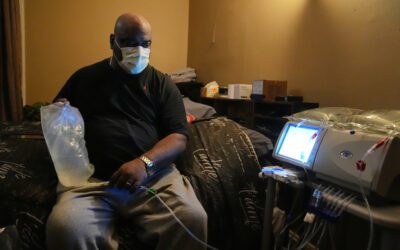
Gov. Josh Shapiro replies to a question about the effects of the 'Big Beautiful Bill' on Medicaid and SNAP in Pennsylvania during a press conference. (Photo: USA Today Network)
More than 132,000 Pennsylvanians on food assistance have been mailed notices that they might now have to follow federal work reporting requirements or risk losing benefits, according to the state.
Officials sent these aid recipients a questionnaire meant to gauge whether they might qualify for a work exemption or if they’re already employed and complying with the rules imposed by President Donald Trump’s “big, beautiful” tax bill.
Because of the legislation approved by Congress in July, the commonwealth no longer qualifies for geographic carveouts that had shielded most of the state’s residents from work requirements if they were enrolled in the Supplemental Nutrition Assistance Program (SNAP).
As of Sept. 1, many nutrition aid recipients must prove they’re working at least 20 hours a week or attending education or job training programs. Program enrollees who fail to comply will lose their food stamps after three months, or by Dec. 1, and will be locked out of SNAP for nearly three years unless they start following the requirements.
Gov. Josh Shapiro’s administration has estimated that 144,000 commonwealth residents could get ejected from the federal nutrition assistance program because of the harsher mandates triggered by the bill.
But the program will still include exemptions to the requirement, and state human services officials report they’ve mailed out 132,038 questionnaires to people to see if they might fall into one of these categories.
The Pennsylvania Department of Human Services has also been emailing and texting people who might be affected by the changes “so that those who need and qualify for SNAP benefits will still receive them,” agency spokesman Brandon Cwalina wrote in a message.
However, Louise Hayes, supervising attorney with Community Legal Services of Philadelphia, said many benefit recipients are still unaware of the new requirements.
Often, people have overlooked the state’s outreach or have problems with the mail and literacy challenges that have prevented them from reading the questionnaire, she explained.
Clients who have completed the screening form, she said, are anxious about whether case workers have approved their exemption status or affirmed their compliance with the job mandates. So far, officials haven’t been notifying people about their status, and she said Community Legal Services has been advising clients to contact county assistance offices to ask for an update.
More broadly, Hayes said, the expanded requirements are creating uncertainty and worry, even for recipients who wouldn’t be affected by them.
“There’s this overwhelming anxiety about, am I going to be able to keep my SNAP? Have I done enough to keep my SNAP? I don’t know my status,” she said.
She said state human services officials have faced an enormous challenge in following the federal mandates on such short notice, with just a few weeks between the bill’s passage and the program changes.
People don’t fall under the employment requirements if they are 55 or older or have a physical or mental health problem that interferes with working. SNAP recipients are also exempt if they are caring for a child younger than 18, are caring for someone who is sick or disabled, are pregnant, are in a substance abuse treatment program or fall into several other categories.
Hayes said most program participants who can hold down a job are already employed or would qualify for one of the exemptions. Her fear is that people will largely lose benefits because they didn’t know about the reporting requirements or because of clerical errors.
Correcting those mistakes depends on getting through to assistance offices that are understaffed and will likely be grappling with a flood of calls when SNAP recipients start getting dropped from the program, she added.
Another round of changes will kick in Nov. 1, when the work requirement will also expand to include parents of kids from 14 to 18, people who are ages 55 to 64, veterans and people who were formerly in the foster care system.
However, Hayes said these rules will roll out more gradually, applying to people as they enroll in SNAP or come up for renewals. Since this process involves a conversation with a caseworker, she’s hopeful fewer people will be caught off-guard.
Almost 2 million Pennsylvanians rely on SNAP benefits, and Shapiro’s administration has condemned the program overhaul spearheaded by Trump and congressional Republicans.
“SNAP helps people meet one of our most essential needs — allowing them to participate fully in work and school and live healthier,” Val Arkoosh, Pennsylvania’s secretary of human services, said in a statement. She added that the “big beautiful” bill changes would “fundamentally destabilize” the program.
In fact, Shapiro has warned that the legislation could cause SNAP in the commonwealth to buckle entirely. The bill calls for shifting immense program costs to states with payment error rates that exceed certain levels. If the commonwealth’s rate of overpayments and underpayments remains unchanged, it would have to shoulder hundreds of millions of dollars in additional expenses each year.
Shapiro has said the state “can’t backfill” those funding cuts, creating a shortfall that would jeopardize the nutrition assistance program as a whole in Pennsylvania.

Pennsylvania libraries celebrate $5 million boost in state budget
By Danielle Smith Pennsylvania public libraries are receiving a long-awaited boost in state funding to expand programs, digital access...

Labor unions back firefighter to oust Republican congressman
Firefighter Bob Brooks has secured nine labor endorsements since launching his US House campaign and is uniting factions of the Democratic Party...

Mifflin county hospital workers deliver Christmas cards and flowers to avert strike
Geisinger hospital workers, tired of making $15.30 an hour, delivered Christmas cards and flowers to executives in order to avert a strike and win...

US Energy Secretary says Three Mile Island restart delivers on Trump administration promises
The nuclear plant near Harrisburg is slated to restart by 2027 to power Microsoft data centers. Microsoft and Constellation Energy’s effort to...

Pa. Republican seeks to recoup $1M spent on security at Shapiro’s home
Pennsylvania taxpayers are poised to spend more than $1 million on security upgrades at Gov. Josh Shapiro’s private home, and a GOP lawmaker wants...




